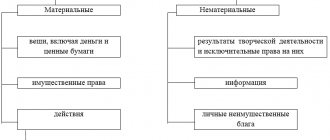Citizens as subjects of civil legal relations. Educational and methodological manual
Chapter 2
Civil personality of citizens
Citizens are “natural” subjects: their appearance in civil circulation and departure from it are determined by the natural biological processes of birth and death, and not by legal procedures. Therefore, if for some reason a citizen is not registered anywhere, he still remains a subject of civil law.
The “natural nature” of a person, a citizen, determines the features of his legal personality - the legal ability to be a participant in legal relations, based on the rules of law. Legal personality includes the legal capacity and capacity of a citizen.
Civil legal capacity is the ability of a citizen to have civil rights and bear civil responsibilities.
Civil capacity is the ability of a citizen, through his actions, to acquire and exercise civil rights, create civil responsibilities for himself and fulfill them.
Characteristics of the legal capacity of citizens:
— arises at the moment of birth and ends with the biological death of a citizen
(Article 17 of the Civil Code of the Russian Federation). Declaration of a citizen by a court as deceased, based on the presumption of death, does not entail the termination of legal capacity;
— has a natural legal nature: on the one hand, it belongs to the citizen from birth and “follows” him everywhere, but on the other hand, it is regulated by law.
Legal capacity is a product and reflection of the state of law and legislation of a particular historical era. Thus, the legal capacity of individuals under Roman law depended on the status of freedom, citizenship and marital status. Only free Roman citizens who were not under the authority of a householder had full legal capacity;
— has an abstract character - it is the opportunity for any and every person, citizen to be a bearer of civil rights and obligations, an approximate list of which is given in Art. 18 Civil Code of the Russian Federation
(citizens can own property; inherit and bequeath property; engage in business and any other activity not prohibited by law; create legal entities independently or jointly with other citizens and legal entities; make any transactions that do not contradict the law and participate in obligations; elect a place residence; have the rights of authors of works of science, literature and art, inventions and other results of intellectual activity protected by law; have other property and personal non-property rights). Thus, the law determines the content of legal capacity through the abstract possibility of possessing (that is, possessing in general, in principle, potentially) various civil rights and the possibility of bearing the responsibilities associated with such rights;
— is not associated with the commission of volitional actions.
A legally capable citizen may well be incompetent (Articles 28, 29 of the Civil Code of the Russian Federation), that is, incapable of independently performing volitional actions. In this case, he cannot independently make transactions and bear property liability, however, instead of him and for him, his capable legal representatives (parents, adoptive parents, guardians) make up for the lack of legal capacity;
— is common (single) and is equally recognized for all citizens.
Accordingly, legal capacity cannot be differentiated according to one or another social group characteristic. This also applies to foreign citizens and stateless persons, unless, of course, federal law provides otherwise;
— impossibility of limiting legal capacity except in cases and in the manner established by law
(clause 1 of article 22 of the Civil Code of the Russian Federation). According to the general principles of civil legislation, civil rights can be limited on the basis of federal law and only to the extent necessary to protect the foundations of the constitutional system, morality, health, rights and legitimate interests of other persons, ensuring the defense of the country and the security of the state. Restrictions on certain rights and freedoms, indicating the limits and duration of their validity, can be established in a state of emergency and in accordance with federal constitutional law to ensure the safety of citizens and protect the constitutional order (Article 56 of the Constitution of the Russian Federation). Limitation of legal capacity is possible for an offense committed. Thus, among criminal penalties, the law provides for deprivation of the right to hold certain positions or engage in certain activities, restriction and imprisonment, including life imprisonment;
— a citizen's complete or partial renunciation of legal capacity and other transactions aimed at limiting it are void, except in cases where such transactions are permitted by law
(clause 3 of article 22 of the Civil Code of the Russian Federation). Therefore, even a voluntary restriction of oneself in certain rights is deprived of legal significance, regardless of what the citizen was guided by;
— as long as a citizen is alive, he cannot be deprived of legal capacity in general, therefore, permissible cases of restriction of legal capacity mean nothing more than a defeat in certain types of rights.
Such cases cannot be confused with the restriction of subjective rights when a specific (single) right is limited, for example, when establishing an easement, a voluntary purchase by a citizen of an item encumbered by the right of a third party. A transaction may limit the legal capacity of a citizen if the law allows it (clause 3 of Article 22 of the Civil Code of the Russian Federation). Thus, the forced termination of ownership of specific property does not exclude the possibility of acquiring similar property (unless, of course, we are talking about things that are limited in circulation), which is impossible when legal capacity is limited. In the given examples, a certain group (category) of rights is not limited, as should be the case when legal capacity is limited (for example, the right to purchase certain goods), but only a specific right in a specific situation;
— This is a general premise on the basis of which, in the presence of certain legal facts, a person has subjective rights and obligations.
Therefore, legal capacity cannot be identified with specific subjective rights;
— Legal capacity does not mean equality at the level of specific subjective rights:
the acquisition of the latter is influenced by various circumstances (health, property status, desire of a particular person, etc.). Thus, everyone can own a car, but one is not able to purchase it due to low income, another does not feel the need for it due to the presence of a company car, and a third prefers public transport.
Characteristics of the legal capacity of citizens:
— has a natural legal nature, is inalienable and cannot be limited except in cases and in accordance with the procedure established by law.
A citizen’s complete or partial refusal of legal capacity, as well as other transactions aimed at limiting it, are void, except in cases where such transactions are permitted by law (clauses 1, 3, Article 22 of the Civil Code of the Russian Federation);
— consists of two elements: transactional capacity (the ability to make, execute transactions and other lawful actions) and tortious capacity (to bear contractual and non-contractual (tort) liability);
- this is the opportunity to exercise civil rights and corresponding civil responsibilities through one’s own volitional actions.
In order to acquire, exercise rights and bear responsibilities, a citizen must reach a certain age and psychological level when he is adequately able to understand the meaning of his actions and manage them.
The ability to adequately understand the meaning of one’s actions, control them and foresee their consequences depends on a number of circumstances:
a) age;
b) mental health;
c) some bad habits and the consequences they cause.
Therefore, depending on this, the scope of legal capacity of different citizens may be the same or unequal in terms of transaction capacity and (or) delict capacity. Hence, legal capacity (as opposed to legal capacity) is a group phenomenon, which depends on which social group, from among those established by law, the citizen belongs to;
As a general rule, full legal capacity arises upon reaching 18 years of age (the age of majority). The Civil Code of the Russian Federation establishes two cases when full legal capacity occurs before adulthood (i.e., “early”).
Marriage before reaching 18 years of age
(Article 21 of the Civil Code of the Russian Federation). The procedure and conditions under which minor citizens are allowed to marry are established by family law and, above all, by the Family Code of the Russian Federation (hereinafter referred to as the RF IC). According to Art. 13 of the RF IC, the age of marriage is set at 18 years. If there are valid reasons, local government bodies at the place of residence of persons wishing to get married have the right, at the request of these persons, to allow persons over 16 years of age to marry.
Family legislation is under the joint jurisdiction of the Russian Federation and its constituent entities, whose laws, as an exception, taking into account special circumstances, may allow marriage before reaching the age of 16 years (pregnancy, childbirth). Moreover, in some regions of the Russian Federation there is no “minimum” age for marriage at all.
If a minor (both minors) gets married, he acquires full legal capacity from the time of marriage. To acquire full legal capacity, no other (additional) procedure is required other than marriage and its registration with the civil registry office. The legal capacity acquired by one (both) spouses in full automatically does not depend on whether the marriage is dissolved before reaching the age of majority. And only if the marriage is declared invalid, the court can (but is not obliged) to make a decision on the loss of full legal capacity by the minor spouse, and from the moment determined by the court itself (clause 2 of Article 21 of the Civil Code of the Russian Federation). This point may be: the date of registration of a marriage declared invalid (the law establishes the following grounds for the invalidity of a marriage: lack of mutual voluntary consent to marry, not reaching marriageable age, the presence of a previous unresolved marriage, as well as kinship or adoption relationships, incapacity, concealment of a venereal disease or HIV, entering into a fictitious marriage); date of recognition of marriage as invalid; another date. The court's decision to retain full legal capacity for a minor or to lose it depends on the grounds for the invalidity of the marriage.
Emancipation - declaring a minor who has reached the age of 16 fully capable
(Article 27 of the Civil Code of the Russian Federation). A mandatory prerequisite for emancipation is the labor or entrepreneurial activity of a minor, during which he must prove his social maturity in order to be able to “early” obtain full legal capacity. Sufficient evidence of such maturity, along with the work activity of a minor, can be membership in a production cooperative, which is rightly noted in the literature, given that Art. 27 of the Civil Code of the Russian Federation leaves this question open. Since the Civil Code of the Russian Federation does not say anything about the required duration of labor or entrepreneurial activity, the literature has expressed the opinion that the very fact of a concluded employment contract or registration of a minor entrepreneur (or membership in a cooperative) is sufficient.
Emancipation, depending on the attitude towards it on the part of the legal representatives of the minor, can be of two types. Subject to the consent of both parents (adoptive parents) or trustee, emancipation is carried out by the guardianship and trusteeship authorities (administrative emancipation).
But if at least one of these persons opposes emancipation, the minor can go to court at his place of residence and seek
judicial emancipation.
Judicial emancipation is carried out in accordance with special proceedings (Chapter 32 of the Civil Procedure Code of the Russian Federation (hereinafter referred to as the Code of Civil Procedure of the Russian Federation).
With emancipation, a minor acquires full legal capacity, except for those rights and obligations for which there is an age limit. Thus, despite acquiring full legal capacity, a minor citizen (both emancipated and married before reaching adulthood) cannot be an adoptive parent: the law requires the latter to reach the age of majority.
A citizen may be declared incompetent by a court if, due to a mental disorder, he cannot understand the meaning of his actions or control them
(Article 29 of the Civil Code of the Russian Federation). Not every mental disorder, even one that is quite obvious to others and indisputable to non-specialists, can become a sufficient reason to declare a citizen incompetent. The mental disorder must be such that the citizen either cannot understand the meaning of his actions; or, although he can understand the meaning of his actions, he cannot direct them, while one and (or) the other prevents his full participation in civil circulation (hence, the disorder should not be temporary, but permanent, sustainable).
Recognition of a citizen as incompetent is possible only by a court decision made in a special proceeding based on the conclusion of a forensic psychiatric examination (Chapter 31 of the Code of Civil Procedure of the Russian Federation).
By virtue of a court decision, a citizen is deprived of legal capacity, i.e., he cannot independently make transactions and bear responsibility for his actions. The purpose of recognition as incompetent is to ensure the protection of the property and personal rights and interests of a mentally ill citizen, as well as his family. On behalf of a citizen declared incompetent, all transactions are carried out by his guardian, taking into account the opinion of such a citizen, and if it is impossible to establish his opinion, taking into account information about his preferences received from the parents of such a citizen, his previous guardians, other persons who provided services to such a citizen and who performed their duties conscientiously.
Thus, the transaction capacity of a person declared incompetent is “zero”, since the law does not make even minimal exceptions in this regard. Accordingly, all transactions independently completed by a citizen recognized as incompetent are invalid (void) and require the use of bilateral restitution, i.e., the return of everything received by the parties to its original position, and if it is impossible to return what was received in kind, compensation for its value (Article 171 of the Civil Code RF). Since the law recognizes such transactions as an invalid legal fact (not giving rise to normal civil legal consequences), an incompetent citizen is not liable for the transactions he has made, however, his capable counterparty must compensate him for real damage if he knew or should have known about his incapacity (Art. 171 Civil Code of the Russian Federation).
A citizen declared incompetent by a court is not responsible for the harm caused by him: such harm is compensated by his guardian or the organization obliged to supervise him (in particular, a psychiatric hospital), in all cases, unless they prove that the harm arose not through their fault (Clause 1 of Article 1076 of the Civil Code of the Russian Federation). These persons, therefore, are liable on the basis of guilt, and since they are responsible for their own guilt, which consists of deficiencies in control (supervision) over an incompetent citizen, they are responsible for compensation for harm even if the incapacitated tortfeasor is subsequently recognized as capable (clause 2 Article 1076 of the Civil Code of the Russian Federation) and are deprived of the right of recourse (clause 4 of Article 1081 of the Civil Code of the Russian Federation).
If the guardian effectively proves that the adverse consequences were not his fault, the risk of loss falls on the victim of the actions of the incapacitated person or on a third party (in particular, the insurer). An incompetent citizen may be subject to the obligation to compensate for the harm caused to him only on the basis of clause 3 of Art. 1076 of the Civil Code of the Russian Federation.
Declaring a citizen incompetent entails other legal consequences. Thus, incapacity prevents marriage and is the basis for the dissolution of an existing marriage in a simplified manner (i.e., in the registry office). The incapacity of a citizen (including the incapacity of one of the spouses) is a basis that prevents the adoption of children.
With the development of the ability of a citizen who has been declared incompetent to understand the meaning of his actions or to direct them only with the help of other persons, the court recognizes such a citizen as having limited legal capacity in accordance with paragraph 2 of Art. 30 Civil Code of the Russian Federation. When restoring the ability of a citizen who has been declared incompetent to understand the meaning of his actions or direct them, the court recognizes him as competent. Based on a court decision, the guardianship established over the citizen is canceled and, if the citizen is recognized as having limited legal capacity, guardianship is established.
A citizen may be limited in legal capacity
(Articles 26, 30 of the Civil Code of the Russian Federation). Limitation of a citizen’s legal capacity is a special legal measure (sanction). This measure is not applied to minors due to their lack of legal capacity, as well as the possibility of their legal representatives exercising actual power in relation to this category of citizens. It is applied only by the court and only in relation to citizens who have partial or full legal capacity, i.e. in relation to persons from 14 to 18 years of age (clause 4 of article 26 of the Civil Code of the Russian Federation) and adults, as well as persons equated to them (art. 30 Civil Code of the Russian Federation).
Limiting the legal capacity of a citizen means reducing his civil legal capabilities in comparison with how they are provided by law for the corresponding age group. Restriction of legal capacity is carried out in accordance with special proceedings (Chapter 31 of the Code of Civil Procedure of the Russian Federation).
Minors aged 14 to 18 years (except for those who acquired full legal capacity ahead of schedule in accordance with paragraph 2 of Article 21 and 27 of the Civil Code of the Russian Federation) may be limited in legal capacity by the court at the request of their parents (adoptive parents) or trustee, or guardianship authority and guardianship in the presence of any sufficient grounds.
Such grounds may include not only the minor’s addiction to alcohol, drugs, gambling, but also other bad habits, as well as unreasonable (irrational, inappropriate), from the point of view of the applicants, spending money (on computer programs, disks, collecting certain items etc.) to the detriment of solving pressing everyday issues (purchasing clothes, food, etc.). The sufficiency of grounds for limiting the legal capacity of a minor depends on the assessment of his legal representatives, which may be different in each specific case.
The purpose of limiting the legal capacity of minors is to limit or deprive them of the right to independently manage their earnings, scholarships and other income. At the same time, all other rights belonging to them and their delict capacity cannot be subject to restrictions. The choice between restriction and deprivation of the right to freely dispose of earnings, scholarships and other income depends on the wishes of the applicant, the specific circumstances of the case and the discretion of the court. After the restriction of legal capacity, the earnings, scholarships and other income of a minor, based on a court decision, must be issued to his parents (adoptive parents) or guardian (in part or in full). Accordingly, a minor can dispose of his earnings, scholarships and other income only with the consent of his parents (adoptive parents) or guardian (in part or in full).
Taking into account the uncertainty in paragraph 4 of Art. 26 of the Civil Code of the Russian Federation and Ch. 31 of the Code of Civil Procedure of the Russian Federation on a number of specific issues, as well as the fact that the restriction of the legal capacity of minors applies only to citizens aged 14 to 18 years, it can be assumed that the measure referred to in paragraph 4 of Art. 26, valid:
- up to the acquisition of full legal capacity by a citizen (including acquisition ahead of schedule, in particular, as a result of marriage);
- up to its cancellation by the court;
- within the period specifically established in the court decision.
Adults and citizens equivalent to them (i.e., fully capable) may be limited in their legal capacity by a court if there is an actual composition of two consecutively related legal facts: abuse of alcohol or drugs, addiction to gambling; putting the family in a difficult financial situation (Article 30 of the Civil Code of the Russian Federation).
The law does not make the possibility of limiting legal capacity dependent on the recognition of a citizen as a chronic alcoholic or drug addict. Abuse of alcoholic beverages or drugs by a citizen is understood as such excessive or systematic use of them, which is contrary to the interests of the family and entails unaffordable expenses for their purchase, which, in turn, causes financial difficulties and puts the family in a difficult situation. It is also noteworthy that if a family does not receive the necessary material support from an abusive citizen or is forced to support him in whole or in part, then the presence of earnings or other income from other family members is not in itself a basis for refusing to limit the legal capacity of the abusive citizen.
So, the abuse of alcoholic beverages, drugs, addiction to gambling reveals such signs as excessive, systematic use (i.e., excessive and indefatigable use, including the use of drugs not due to a medical purpose), spending significant sums of money on gambling, which ultimately leads to the acquisition by a citizen of persistent alcohol (drug) or gaming addiction and to personality degradation. In turn, the difficult financial situation of a family should be assessed not from the point of view of its general financial condition and the presence of other sources of income, but as the family’s failure to receive funds from a specific member - an abusive citizen, as a result of which the family is forced to support him, in addition spend your budget on his addictions. Hence, the difficult financial situation is a significant deprivation of the family of what it could have received if the citizen had not abused it, a deprivation that ultimately leads to its impoverishment.
Although Art. 10 of the Civil Code of the Russian Federation, which establishes a general ban on abuse of rights, does not correspond to Art. 30 of the Civil Code of the Russian Federation, there is hardly any doubt that the latter is devoted to a special case of abuse of right - the abuse by a citizen of the right to dispose of his own income to the detriment of the interests of his family. Since the law, limiting the legal capacity of a citizen, does not set itself the goal of combating drunkenness, drug addiction, and gambling (as well as punishing a drunkard, drug addict, or gambling addict), but only protects the property interests of the citizen’s family, limiting legal capacity is possible only if there are these facts related to among themselves as a cause (abuse) and a consequence (difficult financial situation). The absence of one of them (in particular, drunkenness of a single citizen or the difficult financial situation of the family, not caused by the citizen’s abuse of alcohol or drugs, gambling, but caused by other reasons, for example, the need to pay a large debt, pay alimony, etc.) excludes the possibility restrictions on a citizen's legal capacity. This possibility is also excluded by other circumstances not directly provided for by law (for example, risky business activities, nightclubs, the opposite sex, various hobbies - quite harmless in essence, but at the same time very expensive, etc.). And although such “hobbies” and “predilections” can be no less expensive for a family than the abuses mentioned in Art. 30 of the Civil Code of the Russian Federation, a citizen, however, in all these and other cases cannot be limited in legal capacity.
The fact is that:
— the law allows limiting legal capacity only in cases and in the manner established by law (clause 1 of article 22 of the Civil Code of the Russian Federation);
- wording of art. 30 of the Civil Code of the Russian Federation and the exceptional nature of the rule formulated by it do not allow a broad interpretation of the grounds for limiting the legal capacity of a citizen;
— the use in this case of the analogy of the law (clause 1 of Article 6 of the Civil Code of the Russian Federation) is hampered by both the special essence of the citizen’s legal capacity and the lack of a similar regulated relationship.
Limitation of the legal capacity of adults and citizens equated to them comes down to the limitation of transactional capacity alone, as a result of which they cannot independently, without the consent of the trustee, sell, give, bequeath, exchange, buy property, make other transactions for the disposal of property (except for small household ones), and independently receive wages, pensions and other types of income (author's fees, amounts due for the performance of work under a contract, other remunerations, all kinds of benefits, etc.) and manage their income.
End of introductory fragment.
Types of participants in labor relations
Participants in labor relations are often limited to the parties of the employee and the employer. The list of such subjects is much wider than the circle of persons established in Art. 20 Labor Code of the Russian Federation. The parties to the contract are only the most common participants in the employment relationship. They can be called the main subjects. Along with them, there are many additional participants:
- authorities monitoring compliance with labor laws;
- trade union organizations;
- labor dispute commissions;
- structures operating within the framework of social partnership in the labor sphere.
The activities of the listed entities are derivative in nature and are associated with separate procedures provided for by law. For this reason, they can be classified as an additional category.
The employee as a participant in labor relations
According to Art. 20 of the Labor Code of the Russian Federation, only individuals can be employees. At the time of concluding an employment contract, the applicant must be at least 16 years old. There are several exceptions to this rule established by Art. 63 Labor Code of the Russian Federation:
- A contract can be concluded by a 15-year-old teenager if the work falls into the category of light work that is not associated with harm to health.
- With the consent of the legal representative or the guardianship and trusteeship authority, an agreement can be concluded with a 14-year-old employee. At the same time, he can carry out safe and easy work only in his free time from school.
- In some cases, it is possible to attract workers under 14 years of age. We are talking about various creative teams. The agreement is signed with the legal representative or guardian on the basis of a permit issued by the guardianship and trusteeship authority.
At the moment of signing the contract, an individual acquires the status of an employee, provided for in Art. 21 Labor Code of the Russian Federation.
IMPORTANT! Disputes can arise when a company sends its employees to work for another organization. Such cases are called personnel leasing and are regulated by Chapter 53.1 of the Labor Code of the Russian Federation.
A legal entity providing labor resources cannot be considered an employee, since direct labor functions are performed by citizens.
The concept of civil personality
To be subjects of any legal relations, persons must be endowed with a special property - legal personality.
Definition 1
Legal personality is a social and legal ability that serves as a measure of a person’s participation in civil legal relations.
Civil legal personality has the following features:
- it is based on the norms of civil (and for public entities – also public) law;
- it is a consequence of the existence of an ongoing connection between a private individual and the state, which determines the possibilities for the participation of various subjects in social relations regulated by law.
Legal personality is a basic prerequisite for a person to have civil rights and obligations in specific legal relations. As a condition for a person’s participation in a legal relationship, this category is enshrined in Chapter 3 of the Civil Code of the Russian Federation, as well as in the articles of the special part of the Civil Code of the Russian Federation. We have already completed an abstract
Courts of the Russian Federation in more detail.
Are you an expert in this subject area? We invite you to become the author of the Directory Working Conditions







